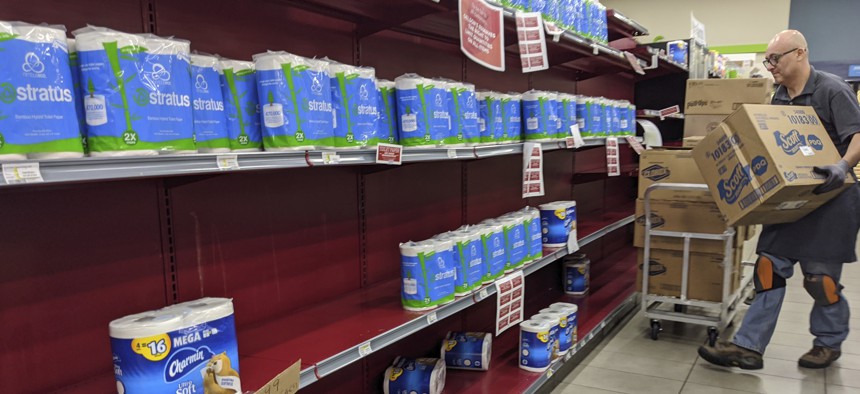$60 for Toilet Paper? How Attorneys General Are Fighting Price Gougers

Toilet paper is restocked at the Gelson's Market in Los Feliz neighborhood of Los Angeles on Thursday, March 26, 2020. AP Photo/Damian Dovarganes

Connecting state and local government leaders
State attorneys general are inundated with price gouging complaints and working with online retailers to crack down on overpriced items.
With toilet paper, face masks, and hand sanitizer in high demand during the coronavirus outbreak, attorneys general across the country are shifting into overdrive to fend off price gouging.
Forty states have laws on the books that allow prosecutors to take legal action to crack down on attempts to drastically mark up the price of goods and service, according to the National Association of Attorneys General. In other states without specific price gouging statutes, like Delaware and Minnesota, lawmakers have issued executive orders that ban the practice.
Texas Attorney General Ken Paxton this week sued an online auction website in the state that significantly marked up the price of N95 respirator masks used by hospital workers. Bidding on the site, Auctions Unlimited, drove the price for 16 masks up to $180, according to Paxton’s office. A package of the masks would typically sell for $10 to $20.
But it’s hardly the only complaint the office is looking into. The office has received nearly 3,300 complaints related to the coronavirus outbreak, with 3,054 complaints alleging price gouging, said spokeswoman Kayleigh Date.
This week a coalition of 33 attorneys general wrote to five major companies with online sales platforms—Amazon, Walmart, eBay, Facebook and Craigslist—to enlist their help to crack down on overpriced items. They asked the companies to set policies and restrictions that would prevent sellers from inflating the price of products during an emergency.
“Rather than playing whack-a-mole to stop price gouging after it has already occurred, online retail platforms should prevent unconscionable price increases from occurring in the first place,” the attorneys general wrote.
Several state attorneys general have announced investigations this week after working with Amazon to identify suspected price gouging. Prosecutors in Kentucky, North Carolina, and Florida issued subpoenas to third-party sellers suspected of price gouging through Amazon.
Across the country, many of the complaints attorneys general have seen are related to items that consumers have reportedly been hoarding.
“It’s toilet paper, it’s the Lysol spray,” said Abigail Stempson, the director of the National Attorneys General Training and Research Institute’s Center for Consumer Protection. “Price gougers are always going to take what people want.”
The center is tracking legal action that attorneys general have taken in response to the crisis and also providing education to consumers about how to file a complaint if they do suspect a business has illegally raised prices.
State laws regarding price gouging vary widely, Stempson said. Some define price gouging by the percentage the price of a product increases, while others make it illegal to raise the price of necessary products by an unreasonable amount.
Texas state law, for example, prohibits people from “taking advantage of a disaster declared by the governor” by selling fuel, food, medicine, or other necessities “at an exorbitant or excessive price.” Anyone convicted of price gouging under the law could be made to pay back consumers and be hit with a fine ranging from $10,000 to $250,000.
To combat price gouging, state attorneys general have opened consumer protection hotlines, created dedicated web sites and begun to churn out cease and desist orders to those suspected of drastically marking up the price of goods and services.
“A lot of times the AG may hand deliver the cease and desist letter to say we are serious and you need to stop,” Stempson said.
But prosecutors have sought legal action in some cases. In addition to the Texas lawsuit, the Missouri attorney general filed a temporary restraining order earlier this month against televangelist Jim Bakker for claiming to have a viable treatment for the novel coronavirus.
As the outbreak continues, Stempson said state prosecutors will have their hands full. As attorneys general crack down on price gouging, she warned that consumers should also be on the lookout for new scams seeking to collect and exploit personal or to steal the direct cash assistance the federal government will be doling out to many taxpayers.
OTHER STORIES on Route Fifty:
-
‘We’re Doing What We Can’: How a Makeshift Network Is Filling in the Gaps with Medical Supplies
-
Some States Stall Plastic Bag Bans During Coronavirus Outbreak
-
Nearly 200 Cities Short on Supplies for Dealing With Coronavirus, Mayors Report
-
Trump Signs Coronavirus Aid Package—But Democrats Say More Help Needed for States and Cities

NEXT STORY: Coronavirus Shows Cracks in the Gig Economy




